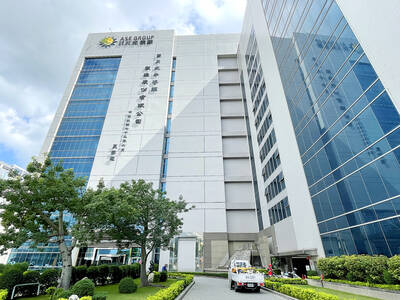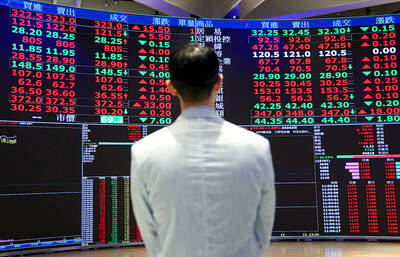Minister of Finance Lee Sush-der (李述德) expressed hope yesterday that tariffs agreements, particularly one on avoiding double taxation, could be signed in the next round of cross-strait talks.
The fourth round of talks between the Straits Exchange Foundation (SEF) and China’s Association for Relations Across the Taiwan Strait (ARATS) is scheduled to be held next month in Taichung.
Lee told a hearing of the legislature’s Finance Committee that the foundation and ARATS negotiators had not discussed the tariffs issues, but would do so before the next SEF-ARATS meeting.
“We hope that the tariff talks will focus on avoiding double taxation and the exchange of taxation information across the Strait,” Lee said in response to questions raised by several legislators about the schedule for signing a tariff agreement.
Chinese Nationalist Party (KMT) Legislator Lu Shiow-yen (盧秀燕) asked Lee whether his ministry had talked to or attempted to communicate with Taiwanese businesspeople operating in China about plans to sign a tariff agreement.
Once such an agreement is signed, information about Taiwanese companies, including their financing, would be completely exposed to Chinese tax authorities, the lawmaker said.
“Has the Ministry of Finance given a thought to how Taiwanese operating in China should protect themselves?” Lu asked.
Lee said the proposed cross-strait tariff agreement would not have a negative impact on Taiwanese businesspeople operating in China.
“For example, avoiding double taxation will help them save on taxes, instead of increasing taxes,” Lee said.
The ministry would first seek legislative approval on an amendment before signing any tariff agreement with China, he said.
Meanwhile, the legislature’s
Economics Committee decided yesterday to ask the Executive Yuan to raise the issue of protection of intellectual property rights (IPR) in the fifth round of cross-strait talks, scheduled for the first half of next year.
Both ruling and opposition legislators on the committee approved a resolution demanding that relevant agencies raise the issue with China.
Their decision was aimed at protecting the IPR of Taiwan’s businesses at a time when many of their trademarks have been pirated by Chinese businesses, legislators said.
The lawmakers also asked that the IPR issue be discussed during next month’s talks.

EXPANSION: The investment came as ASE in July told investors it would accelerate capacity growth to mitigate supply issues, and would boost spending by 16 percent ASE Technology Holding Co (ASE, 日月光投控), the world’s biggest chip assembly and testing service provider, yesterday said it is investing NT$17.6 billion (US$578.6 million) to build a new advanced chip packaging facility in Kaohsiung to cope with fast-growing demand from artificial intelligence (AI), high-performance-computing (HPC) and automotive applications. The new fab, called K18B, is to commence operation in the first quarter of 2028, offering chip-on-wafer-on-substrate (CoWoS) chip packaging and final testing services, ASE said in a statement. The fab is to create 2,000 new jobs upon its completion, ASE said. A wide spectrum of system-level chip packaging technologies would be available at

Taiwan’s foreign exchange reserves hit a record high at the end of last month, surpassing the US$600 billion mark for the first time, the central bank said yesterday. Last month, the country’s foreign exchange reserves rose US$5.51 billion from a month earlier to reach US$602.94 billion due to an increase in returns from the central bank’s portfolio management, the movement of other foreign currencies in the portfolio against the US dollar and the bank’s efforts to smooth the volatility of the New Taiwan dollar. Department of Foreign Exchange Director-General Eugene Tsai (蔡炯民)said a rate cut cycle launched by the US Federal Reserve

HEAVYWEIGHT: The TAIEX ended up 382.67 points, with about 280 of those points contributed by TSMC shares alone, which rose 2.56 percent to close at NT$1,400 Shares in Taiwan broke records at the end of yesterday’s session after contract chipmaker Taiwan Semiconductor Manufacturing Co (TSMC, 台積電) hit a fresh closing-high amid enthusiasm toward artificial intelligence (AI) development, dealers said. The TAIEX ended up 382.67 points, or 1.45 percent, at the day’s high of 26,761.06. Turnover totaled NT$463.09 billion (US$15.22 billion). “The local main board has repeatedly hit new closing highs in the past few sessions as investors continued to embrace high hopes about AI applications, taking cues from a strong showing in shares of US-based AI chip designer Nvidia Corp,” Hua Nan Securities Co (華南永昌證券) analyst Kevin Su

Nvidia Corp’s major server production partner Hon Hai Precision Industry Co (鴻海精密) reported 10.99 percent year-on-year growth in quarterly sales, signaling healthy demand for artificial intelligence (AI) infrastructure. Revenue totaled NT$2.06 trillion (US$67.72 billion) in the last quarter, in line with analysts’ projections, a company statement said. On a quarterly basis, revenue was up 14.47 percent. Hon Hai’s businesses cover four primary product segments: cloud and networking, smart consumer electronics, computing, and components and other products. Last quarter, “cloud and networking products delivered strong growth, components and other products demonstrated significant growth, while smart consumer electronics and computing products slightly declined,” compared with the